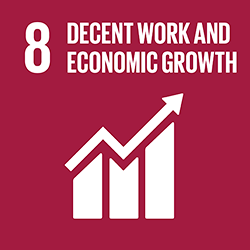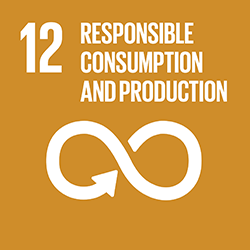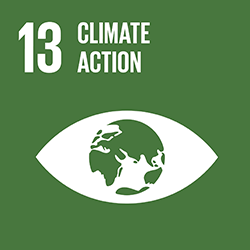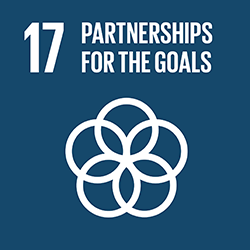Supply Chain Management
Sustainability PrinciplesBuilding an Ethical and Sustainable Supply Chain
Material Topics and Their Meaning
to Sinyi
We consider suppliers as an extension of Sinyi, and are important partners to jointly achieve the sustainability goals. The management approach of Material topic 414 - supplier social assessment follows one of Sinyi’s Sustainability Principle: “Building an Ethical and Sustainable Supply Chain”. A sustainable and ethical supply chain management means to take “innovation, economic and social development, responsible governance” into consideration. Through resource sharing, be a good partner of suppliers, coexist and prosper with the society and environment, we can move towards an inclusive growth together.
Sinyi’s Major Contributions
to the SDGs

Goal 8
Promote inclusive and sustainable economic growth, employment and decent work for all.
Sub-goal: Take immediate, effective measures to ban and eliminate child labor and forced labor; the target is to have ended all forms of child labor by 2025. In addition to protecting the rights and interests of labor, we will also promote safe work environments. Since 2013, Sinyi Realty has comprehensively incorporated human rights conditions into contracts, using these to promote the provision of better working environments for both suppliers and labor.

Goal 12
Ensure sustainable consumption and
production patterns.
Sub-goal: Ensure that people everywhere have information on and awareness of sustainable development by 2030. In order to fully implement corporate ethics into our operations and services, we share with our suppliers our philosophies of ethicality, integrity, and sustainable development, making these core elements of our supply chain management and aiming to Gung Ho with suppliers toward sustainable operations.

Goal 13
Ensure sustainable consumption and
production patterns.
Severe climate change may cause property losses and service being interrupted. We continue to implement 100% local procurement to avoid the risk of international supply chain disruption. However, suppliers must act on environmental protection together in order to reduce the impact caused by natural disasters. We invited some of our upstream and downstream key suppliers to respond to carbon reduction and conducted a GHG emissions of energy survey in 2020.

Goal 17
Strengthen the means of implementation and revitalize the global partnership for sustainable development
In order to deepen sustainable action, we actively participate in various sustainable organizations and jointly promote the SDGs. As an industry leader, we hope to unite the enterprise alliance and supply chain, gathering power in the process, and to speak up together, to attract social awareness, and to spread power to every corner. We cooperate with suppliers to hold public welfare activities and co-create value with them.
Policies|
Sinyi’s policies incorporated international regulations, including the UN Global Compact (human rights, labor, environment, anti-corruption, etc.), the company's core value, and updated with ISO standards as below:
- ISO 26000 Social Responsibility, ISO 9001 Quality Management, ISO 20121 Sustainable Events
- ISO 20400 Sustainable Procurement
- GRI 414 Supplier Social Assessment
- Sinyi’s Sustainability Principle
- Sinyi Suppliers Business Code of Conduct and Sustainability Term
Responsibilities|
Total Ethical Management Committee- Supply Chain Management Group
Future Strategic Goals
-
2023
Short-term Strategic Goal
Establish the quantitative or qualitative goals of each material topic for the next year.
-
2024~2030
Medium-term Strategic Goal
The organization’s future goals and its agenda for improvement in regard to all the dimensions and our material topics.
-
2030+
Long-term Strategic Goal
The organization’s development principles and management controls in the society, environment, and governance dimensions.
-
2023 Short-term Strategic Goal ▼
Short-term Strategic Goal: 2023 Continue to be certified by ISO 20400, participate in CDP disclosure, maintain the inspection rate of key suppliers to 90% or above
Key suppliers include existing and new suppliers. We introduced ISO 20400 Sustainable Procurement, hoping to incorporate sustainable development into management practices and processes. We invite key suppliers to make positive impacts and reduce negative environmental, social, and governance impacts while making decisions.
-
2024~2030 Medium-term Strategic Goal ▼
Medium-term Strategic Goal: 2024~2030 Vision The inspection rate of key suppliers reached 95%, and continue to promote a sustainable, low-carbon supply chain
Through ISO 20400, a supplier sustainability assessment system will be gradually established. We will continue to share learning resources and exchange experience with suppliers, and together to improve, innovate to grow towards a sustainable, low-carbon supply chain.
-
2030+ Long-term Strategic Goal ▼
Long-term Strategic Goal: Sinyi Sustainability PrinciplesBuilding an Ethical and Sustainable Supply Chain
We believe that to expand Sinyi’s core value to suppliers, and to combine Supplier Social Assessment with green procurement, we will be good partners to suppliers, to co-exist and co-prosper with the society and the environment, and to move towards an inclusive growth together.